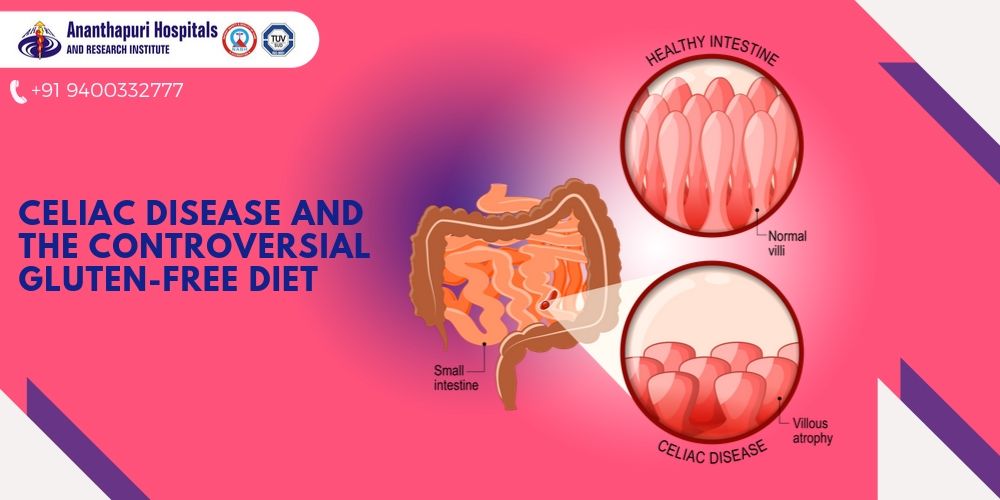- 18/October/2019

Celiac Disease - Gluten Free Diet - Ananthapuri Hospitals, Trivandrum
Over the last few years, there has been an increase in people’s questions about gluten-free foods. To a lot of people, a gluten-free diet is turning out to be a lifestyle choice. But to some others, it’s more than a lifestyle choice - it’s a medical need. Globally, gluten is estimated to affect every 1 in 100 people.
A few weeks back, a worried patient came to me saying she started having constant diarrhoea, migraines, chronic fatigue, bloating, and tingling in her fingers and toes. Upon further rounds of examination, it was found that she had celiac disease.
I am writing this article to address all the common questions about celiac disease and the controversial gluten-free diet.
Celiac disease is an autoimmune disease in which the ingestion of gluten - a group of proteins that occur in various cereals - causes damage to the small intestine.
For people with celiac disease, gluten intake damages the tiny hairlike projections (called villi) that line the small intestine. This can further lead to a condition called malabsorption which prevents the intestine from absorbing vitamins, minerals and other nutrients. In children, malabsorption can affect growth and development.
The precise cause of the celiac disease is unknown. However, your genes and eating foods with gluten can contribute to the disease.
1. What is gluten and is it bad for you?
Gluten is a group of natural storage proteins called prolamins found in a variety of food including wheat. It hardly has any nutritional value. Avoiding gluten is a necessity for some and a choice for others. Therefore, gluten is neither good nor bad.
2. What are the early warning signs of celiac disease?
The symptoms of celiac disease can differ in children and adults. If you suffer from celiac disease and eat something that contains gluten accidentally, you may experience any of the following signs & symptoms:
- Abdominal pain
- Nausea
- Anaemia
- Itchy blistery skin (dermatitis herpetiformis)
- Headaches
- Fatigue
- Bone or joint pain
- Mouth ulcers
- Weight loss
- Heartburn
Children are more likely to suffer from intestinal problems than adults. Intestinal problems include nausea or vomiting, bloating or swelling in the belly, diarrhoea, constipation, pale, foul-smelling stool (steatorrhea) and so on.
Some people experience no symptoms at all, which makes diagnosis very challenging.
3. Is there a cure for celiac disease?
There is no permanent cure for celiac disease. The only way to manage the symptoms of celiac disease is by following a gluten-free diet.
4. What is a celiac disease diet?
The celiac diet, also known as a gluten-free diet, helps to boost intestinal healing.
In this diet, you must strictly avoid any food that contains gluten. You should also make sure that you take nutritional supplements to overcome the shortage of vitamins and minerals from your diet. Consult a nutritionist for appropriate dietary choices and supplement recommendations.
5. What do celiacs not eat?
Be extra careful while choosing processed foods. Food items that you might not expect may be the reason for your suffering. Grains such as wheat, barley, rye, pasta wheat (durum), malt, semolina (rava) and so on, contain gluten in them. Gluten may also be present in medicines and products that you might use regularly like toothpaste, mouthwashes, lipstick and so on.
Examples of foods that may contain gluten include:
- Canned soups
- Salad dressings
- Ice cream
- Candy bars
- Instant coffee
- Ketchup
- Yoghurt
- Pasta
- Pastries
- Beer
6. What do celiacs eat?
Some naturally gluten-free foods that can be a part of your diet are:
- Fruits and vegetables
- Eggs
- Non processed beans, seeds and nuts
- Non processed meats, fish and poultry
Some grains that you can consume:
- Arrowroot
- Buckwheat
- Corn
- Flax
- Millet
- Quinoa
- Rice
- Soy
- Tapioca
Oats could be a great inclusion to your diet. Choose oats that are labelled gluten-free. This can rule out the possibility of them being tainted with wheat.
7. How serious is celiac disease?
If left untreated, celiac disease can result in severe health complications such as intestinal and small bowel cancer. If you experience a combination of the above-mentioned symptoms, visit a gastroenterologist and seek help immediately.
Ananthapuri Hospital has an excellent team of gastroenterologists. To book an appointment, call us at +91 9400332777 or visit our hospital at Chacka, NH Bypass, Thiruvananthapuram.

